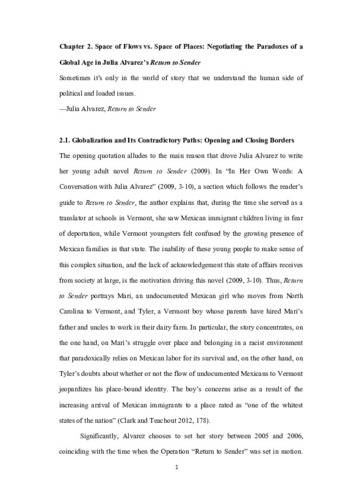Space of flows vs. space of places: negotiating the paradoxes of a global age in Julia Alvarez’s Return to sender
Autor(es) y otros:
Fecha de publicación:
Versión del editor:
Citación:
Serie:
Literatures of the Americas
Descripción física:
Resumen:
In this chapter, Fernández-García analyzes how the protagonists of Julia Alvarez’s Return to Sender reconstitute their identities in and through the space of the US nation and the state of Vermont. Drawing on Manuel Castells’ spatial division between “space of flows” and “space of places,” this chapter starts by introducing the contradictory reality in which Mari and Tyler, the main characters, negotiate their identities: How the continuous immigration of undocumented Mexican workers to Vermont coexists with extreme forms of patriotism that believe in the “true” essence of places. Secondly, Fernández-García explores the dilemmas of identity and belonging encountered by the protagonists. Lastly, she explores how, in the process of reconciling the conflicting paradigms and positions referred to above, Mari and Tyler embrace the paradigm of critical and decolonial cosmopolitanism.
In this chapter, Fernández-García analyzes how the protagonists of Julia Alvarez’s Return to Sender reconstitute their identities in and through the space of the US nation and the state of Vermont. Drawing on Manuel Castells’ spatial division between “space of flows” and “space of places,” this chapter starts by introducing the contradictory reality in which Mari and Tyler, the main characters, negotiate their identities: How the continuous immigration of undocumented Mexican workers to Vermont coexists with extreme forms of patriotism that believe in the “true” essence of places. Secondly, Fernández-García explores the dilemmas of identity and belonging encountered by the protagonists. Lastly, she explores how, in the process of reconciling the conflicting paradigms and positions referred to above, Mari and Tyler embrace the paradigm of critical and decolonial cosmopolitanism.
ISBN:
Patrocinado por:
Proyecto "Extraños Cosmopolitas: Mundos Alternativos en la escritura contemporánea" (Ref. RTI2018-097186-B-I00) y Grupo de Investigación "Intersecciones. Literaturas, culturas y teorías contemporáneas" (Ref. IDI/ 2018/ 000167).
Colecciones
Ficheros en el ítem




